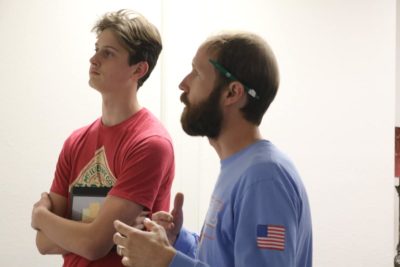

|
|
The return of students to traditional-calendar schools comes as campaigning for the 2022 elections shifts into a higher gear. The condition of American democracy itself has become a core issue in a year in which the balance of power hinges on the configuration of voter turnout.
The Center for Information and Research on Civic Learning and Engagement (CIRCLE) at Tufts University puts North Carolina among the states where mobilization of young people could have a “decisive influence’’ on the outcomes of highly competitive races. “Yet too often they remain ignored by political campaigns and organizations who neglect or underinvest in youth outreach, or target only a fraction of youth,” says a recent CIRCLE report, which sought to identify U.S. Senate and House races in which young voters could make a difference.
According to CIRCLE, North Carolina had a 15% increase in voter registration of 18- to 24-year-olds from June 2018 to June 2022. Under state law, public high schools are instructed to make voter registration applications available to eligible students.
The North Carolina contest between Republican Ted Budd and Democrat Cheri Beasley ranked 7th among Senate races. The 13th Congressional District contest between Republican Bo Hines and Democrat Wiley Nickel ranked 12th among House races.
Since the adoption of the 26th amendment in 1971, young people have cast ballots at a significantly lower rate than their elders. That tendency was dramatically evident in the low-intensity May primary elections. On his Old North State Politics blog, Michael Bitzer, professor of politics and history at Catawba College, reported that about 20% of registered voters cast ballots in May. Among voters ages 18 to 25, a mere 4% took part.
Worrisome evidence of “partisan hostility’’ in the electorate and of disillusionment with the two-party system specifically among young voters emerges from recent Pew Research Center surveys.
“Growing shares in each party now describe those in the other party as more closed-minded, dishonest, immoral and unintelligent than other Americans,” Pew reports. … “Overall, younger adults in the United States are less likely than older adults to identify with a party – and more likely to identify as independents who lean toward one of the two major parties. Still, even among those who identify with a party, younger Republicans are less likely than older Republicans to say the GOP represents the interests of people like them well, and younger Democrats are less likely than older Democrats to say this about the Democratic Party.”
Even though voters tell pollsters they dislike excessively negative politics, high-intensity campaigns, in which people believe their votes matter, expand the electorate. The 2020 presidential election produced record-setting turnout of voters, many primarily motivated to retain or reject Donald Trump as president. CIRCLE estimated that 50% of eligible youth voted, an 11-percentage point increase from 2016.
There is no presidential election on the 2022 general-election ballot so undoubtedly turnout will fall well below the 2020 record. Still, North Carolina voters will decide contests with high stakes: majority control of the U.S. House and Senate; whether Republicans win a veto-proof majority in the General Assembly; the mix of Democratic and Republican justices on the state Supreme Court; and the character of school boards across the state.
As the election at the top of the statewide ballot, the Beasley-Budd Senate race will largely drive turnout. It’s unclear to what extent education issues will define the contest, but their stark differences on this topic point to the yawning chasm between their candidacies that could spark a high-intensity campaign between now and Nov. 8.
On his campaign website, Budd, a third-term congressman who describes himself as a “homeschool dad,” says he favors publicly funded “scholarships” to finance students in private schools and assails Democrats for supporting the teaching of “radical, anti-American ideologies’’ in public schools. He initiated a legislative effort that did not succeed to codify the recommendations of a Trump-appointed commission to promote the teaching of American exceptionalism.
On her website, Beasley, a former state chief justice, says she favors “education funding from cradle to career,” including universal pre-K and fully funding support for students with disabilities. She advocates expanded access to community colleges, apprenticeships, and vocational training.
In North Carolina, where statewide elections are regularly decided by only a few votes, the turnout of any segment of the electorate can make a difference in the outcome. An uptick in turnout among 18-year-olds in high schools, students in community colleges and universities, and recently graduated 20-ish adults could make a difference in determining the near future of institutions with a long mission to produce an educated citizenry fundamental to American democracy.



